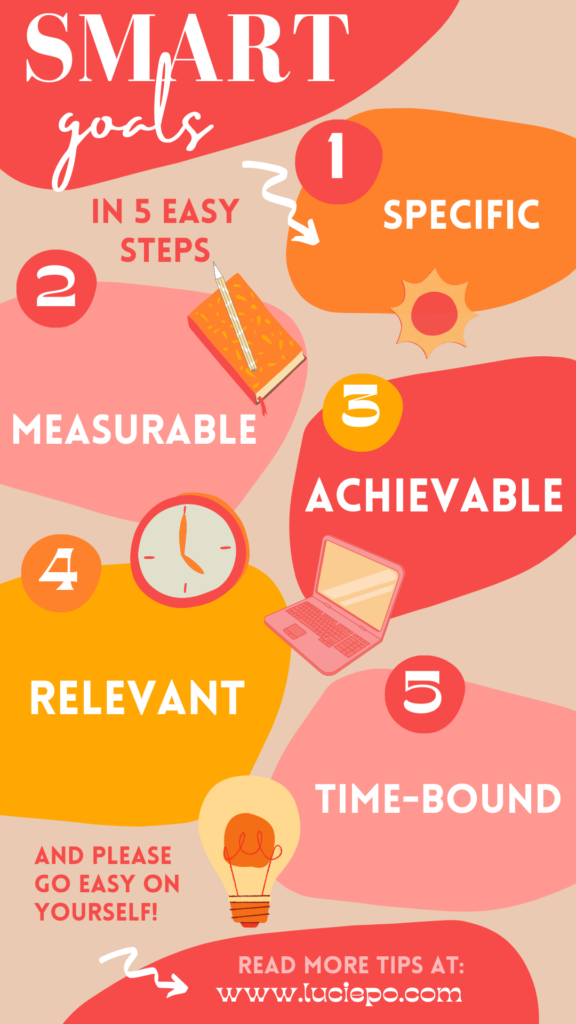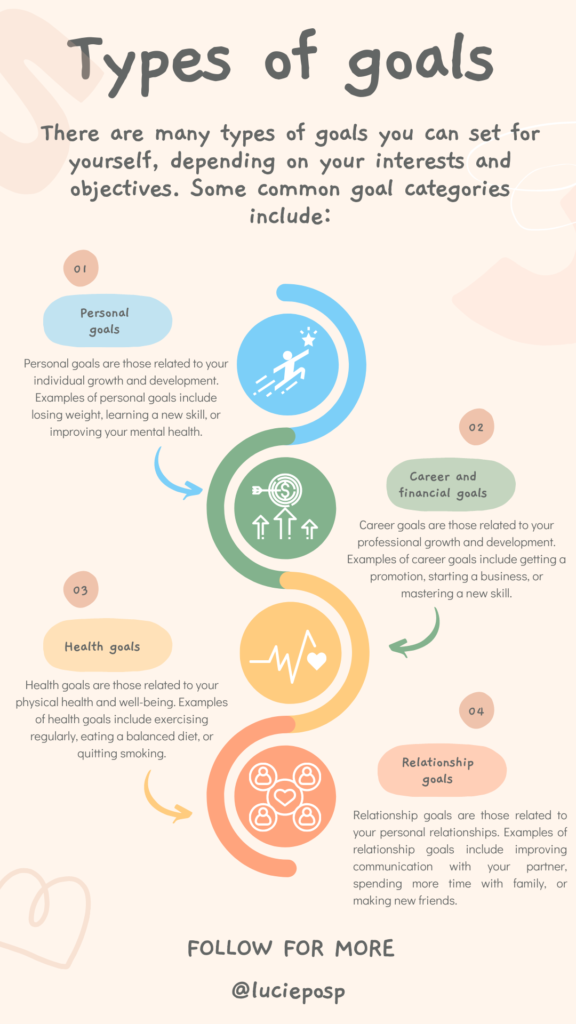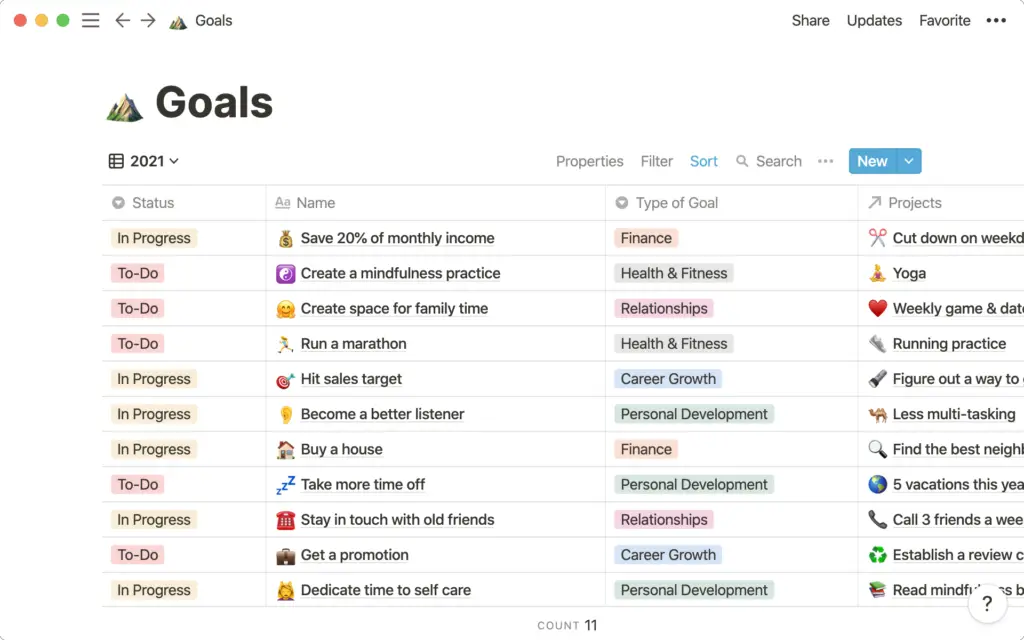
How Set Goals and Achieve Them: Easy Way for Goal Setting
Not sure how set goals and achieve them? Then keep reading!
Are you tired of setting goals and never achieving them? Do you feel like your dreams are always out of reach? Well, it’s time to take control of your life and start achieving your goals with the help of my step-by-step guide to goal setting. In this comprehensive guide, I’ll walk you through the process of setting achievable goals, creating a plan of action, and staying motivated along the way. Whether you’re looking to lose weight, start a new business, or simply improve your daily habits, this guide will give you the tools you need to succeed. So, if you’re ready to turn your dreams into a reality, let’s get started on your journey to achieving your goals!
*This post may contain affiliate links, which means I may receive a small commission, at no cost to you, if you make a purchase through a link!*
Why is goal setting important?
Goal setting is essential for anyone looking to achieve success, both personally and professionally. Setting goals helps you to focus your energy and time on the things that matter most to you, giving you a sense of purpose and direction. Goals also provide motivation, as they give you something to work towards and help you measure your progress along the way. Additionally, setting goals can boost your confidence and self-esteem as you achieve each milestone.
Without clear goals, it can be easy to get sidetracked and lose sight of what you’re working towards. You may find yourself feeling unfulfilled or lacking direction. Setting goals helps you to overcome these challenges and stay on track toward achieving your dreams.
Types of goals
Setting goals can be daunting, but it’s important to remember that we have the power to shape our own destiny. Before embarking on your dream-chasing quest, it’s important to be clear on what type of goals you’re setting. Some common categories include personal, career, financial, and social goals.
Personal goals
One of the most important aspects of life is taking time for yourself. Personal development and growth are integral to our overall health and well-being. Taking the time to focus on one’s personal goals can be life-changing and lead to meaningful transformations.
Personal goals are specifically geared towards developing yourself and your individual growth. Whether learning a new skill, losing weight, or improving mental health, there are many purposeful personal goals to choose from. With dedication and hard work, these goals can be achieved and can lead to a more meaningful and fulfilled life.
In fact, research has suggested that having a clear sense of purpose and setting goals leads to higher happiness. Developing personal goals can give you a sense of purpose and direction in life. With clear intentions, you can focus your energies on the right things and create a positive and rewarding lifestyle.
With this in mind, it’s important to remember that personal goals must be realistic and attainable. While it’s important to set goals that challenge you, it’s also important to set goals that you can realistically achieve.
If you’re having trouble getting started, it can help to take some time and reflect on what is truly important to you. Once you have identified your individual goals, set yourself up for success by making a concrete plan to achieve those goals. Break down the goal into specific tasks and set deadlines for each task. This will make the goal more manageable and attainable.
Setting personal goals can be the gateway to achieving meaningful change in your life. It doesn’t matter if the goal is small or big — they all matter and can add up to a larger, more meaningful transformation. So, take the time to reflect on what is important to you and start focusing on your individual goals. You may be surprised by the results.
Career goals
Career goals are essential to a fulfilling and successful professional life. Whether you’re aiming to reach a high level of success or you simply want to have a satisfying career, having well-defined goals is crucial. Examples of career goals include getting a promotion, starting a business, or mastering a new skill; but there are countless possibilities that can help you to achieve the success you crave.
When setting career goals, it’s important to be realistic and consider your current abilities, your passions, and any potential barriers. Making achievable goals is key, as setting too lofty of objectives can lead to disappointment. It’s also important to consider your career values, as these will have a significant impact on your goals and the choices you make. Do you prioritize financial security? Or do you want to find a career that provides you with meaningful work? Understanding what truly matters to you will make it easier to identify goals that will help to make those aspirations come true.
Reaching your goals will require setting a roadmap for success, and there are several steps you can take to move in the right direction. Take the time to analyze your current skills and identify areas that need improvement. Then, create an action plan that will help you develop the necessary skills and increase your knowledge base. Additionally, networking is an important component of career goal-setting. Connecting with professional contacts can open doors to new opportunities that can help propel you toward your goals.
From finding success in your current role to launching an entire career change, having well-defined career goals is a cornerstone of professional success. With the right plan and mindset, anyone can turn their career aspirations into reality. It’s time to take the steps necessary to create the life you’ve always dreamed of.
Financial goals
Setting sensible and achievable financial goals is of utmost importance when it comes to your financial well-being. Whether your goal is to save up for a down payment on a house, pay off debt, or invest for retirement, a well-developed financial plan can help put you on the path to success. To make sure your plan is successful, however, it’s important to consider the following when it comes to setting financial goals.
First, determine your current financial situation. Take a look at your monthly income versus expenses and decide on how much you can realistically set aside each month for your financial goals. You might even want to keep a running ledger so you can track your progress. Having tangible evidence of how far you’ve come can be an invaluable motivator.
Second, prioritize your goals. You may feel overwhelmed at the thought of tackling multiple goals at once. If that’s the case, experts suggest focusing on one goal at a time. Break it down into smaller, achievable milestones. For instance, if paying off debt is a priority, start by creating a plan to pay off the smaller amounts first, then work your way up.
Third, rely on expert advice. While you may be good at managing your finances, it pays to consult the professionals. A Certified Financial Planner can review your situation and provide valuable insight that can help you devise an effective plan of action. They will also be available if you have questions or need guidance along the way.
The bottom line, setting and achieving financial goals can be a rewarding process. With a well-thought-out plan, sound advice from the experts, and a bit of dedication, you’ll be well on your way to achieving the financial well-being you desire.
Relationship goals
Having a strong and meaningful relationship is a core component of living a fulfilling and content life. Everything from our partnerships to our families and friendships can be found at the nucleus of our wellbeing. However, true relationships are often at risk of becoming neglected and lackluster on the mainstream platforms we inhabit, like social media.
In this digital age, it is essential to take a step back to evaluate the health of our relationships in the real world and set some relationship goals. Relationship goals are those related to real-life interpersonal relationships with people in our lives, such as family members, partners, or friends. Examples of relationship goals might include improving communication with your partner, spending more quality time with your family, or even making new connections.
The best relationships are built upon honest, open, and meaningful dialogue. So it is important to make sure that communication is at the center of your relationship goals. Whether it is with your partner, family, or friends, ensure that you are expressing yourself to the best of your ability. However, it is essential to remember that communication is a two-way street, and it involves being mindful of both the needs of yourself and those around you. A great way to achieve this is to be sure to engage the other party in meaningful dialogue, and actively listen to feedback.
Living in a world of instant gratification, it is easier to get caught up in the non-essential aspects of life than to focus on long-term goals. Unfortunately, this can often be seen in our relationships. Passing the time scrolling through our phones, and neglecting to truly engage with our partners, family, and peers can have a significant detrimental impact on our relationships. That is why it is so important to make it a priority to set relationship goals that will help to strengthen our connections with those in our lives.
Not only will setting meaningful relationship goals make long-term positive impacts, but it can also result in short-term gratification. Everybody wants to feel appreciated and valued by those in their lives, and setting aside time to strengthen relationships can do just that. It can be easy to forget the importance of relationships in the modern day, but setting goals and actively striving to improve your relationships with those in your life is an essential part of living a joyful life. So take some time to evaluate the state of your relationships and set some relationship goals— the rewards are well worth it!
Health goals
When it comes to our health, our goals should be focused on achieving physical and mental well-being. Despite this, many of us still don’t set health goals, either due to lack of awareness or laziness. The truth is, that setting health goals is essential if we want to stay healthy and live a long, happy life.
Examples of health goals include exercising regularly, eating a balanced diet, and quitting smoking. On the surface, these goals may seem relatively simple, but achieving them is often more challenging than we think – especially when it comes to quitting smoking or making drastic dietary changes. That’s why it’s important to have a plan and to set realistic goals.
Developing an effective plan for reaching your health goals starts with understanding what you can do to improve your health. There are many ways to do this, such as finding a healthcare provider that you trust, learning more about nutrition and staying active, and getting the necessary support from family, friends, or a support group.
When it comes to exercise, there are options for all kinds of budgets, age groups, and levels of fitness. You can join a gym, take classes at a local fitness studio, or just take a walk around the block every day. You can also try activities such as group sports, cycling, yoga, or swimming. It doesn’t matter how you do it, as long as you get moving.
Eating a balanced diet is also essential for achieving your health goals. Eating a variety of fruits, vegetables, grains, and proteins is essential for good health. However, avoiding foods that are high in saturated fat, sugar, sodium, and cholesterol is also important. Additionally, drinking plenty of water and limiting your alcohol consumption can help you stay healthy.
Finally, if you’re a smoker, quitting can be one of your most important health goals. Quitting smoking is not easy, and it requires determination and support. Fortunately, there are many resources available to help you quit, such as medications, support groups, and guidance from a healthcare provider.
Ultimately, achieving your health goals requires dedication and discipline. It’s important to remember that health is an ongoing process and that you won’t always see results right away. But with perseverance and a positive attitude, you can reach your health goals and improve your quality of life.
How to set SMART goals
The key to setting achievable goals is to make them SMART: Specific, Measurable, Achievable, Relevant, and Time-bound. Let’s break down each of these components:
Specific
When it comes to setting and achieving goals, the best practice is to make them specific and clearly defined. To make sure your goals are the most effective and achievable, you should be as specific as possible. Rather than setting a broad goal such as “I want to lose weight,” try to focus it more precisely, such as “I want to lose 10 pounds in the next six months.”
When setting goals, try to find a balance between being specific and realistic. That way, you’ll better understand what you need to do to reach your goal, and you’ll have a better chance of succeeding. As a former Olympian, five-time winner of the Tour de France and a Coach on ABC’s “My Extreme Weight Loss” show, Rob DeCarlis understands this concept firsthand: “If your goal lacks detail, or seems too lofty, it’s difficult to know what steps to take or where to start. Setting a goal such as ‘lose 10 pounds in the next six months’ helps break it down into smaller, more achievable targets that are more effective when it comes to managing and reaching your goal.”
To ensure that you stay motivated and on track with your goals, it’s important to create a plan of action and set milestones. Having a timeline can help you to stay focused, and to celebrate when you reach each milestone along the way. Make sure to track your progress, and adjust your plan of action if you need to. It’s also worth remembering that you may not always achieve your goal the first time – it’s important to be open to adjusting it if necessary and to learn from mistakes.
Measurable
When it comes to reaching your goals, the importance of measurable objectives cannot be overstated. You need to know if you’re making progress and achieving success so you can adjust your strategies and continue your journey toward success. This is especially true when it comes to lifestyle goals, such as exercising more, eating better, quitting smoking, or drinking less.
A simple yet effective way to create measurable objectives is to give yourself a goal that is measurable and achievable. For example, instead of simply saying “I want to exercise more”, you could set yourself a goal such as “I want to exercise for 30 minutes, three times a week”.
A measurable goal like this allows you to track your progress and see if you’re making the progress you want. This can help keep you motivated as you can see the tangible progress you’re making in reaching your goals.
Hitting achievable goals can also be inspiring in a more subtle way. Reasons for not continuing down a path of improvement and betterment can be psychological, and tangible rewards, such as when you hit a goal, can help you stay positive and motivated.
According to Dr. Gillian Mandich, a psychotherapist and author, “The rewards we get from achieving our goals can be extremely motivating. This can be crucial in ensuring that we stay on track and don’t abandon our journey.”
At a more practical level, measurable goals can help you plan and organize your life more efficiently. When you create goals with a timeline, you can structure your day-to-day life in a way that helps you achieve them. This can help you make better use of each day and increase your chances of success.
Ultimately, measurable goals should be the cornerstones of any self-improvement effort. They allow you to track your progress, stay motivated and organized, and celebrate your successes. So make sure your goals are measurable, but also achievable. If you set the bar too high and it’s unattainable, not only will you miss out on the rewards of reaching that goal, but you might also lose the motivation that’s so essential for success.
Achievable
Achieving success in anything is all about setting the right goals. Your goals should be inspiring and challenging, but at the same time achievable. By finding the sweet spot between overly difficult goals and goals that are too easy, you can create an achievable roadmap to success.
Setting goals that are impossible to reach can lead to undesired outcomes like frustration and discouragement. You may find yourself unable to make any progress and give up completely. On the opposite end of the spectrum are goals that are too easy. Having goals that you can achieve with ease can lead to complacency and a lack of motivation.
The sweet spot between the two lies in goals that are both challenging and achievable. Challenging goals can get you to step out of your comfort zone and push yourself to achieve something you may not have thought possible. On the other hand, achievable goals can give you a sense of accomplishment and provide a sense of direction. Reaching these goals can give you the confidence and momentum you need to keep striving for more.
It is important to take the time to assess your current abilities and set realistic goals that are tailored to you. This can make it much easier to find the ideal balance between challenge and success. Setting your goals and tracking your progress publicly can also be a great way to keep yourself accountable.
Relevant
Setting and achieving personal goals can be incredibly empowering and motivating. It can also be daunting and intimidating, especially when it involves long-term, life-changing goals, such as saving up for a down payment on a house. The key to success when pursuing such a goal is ensuring that it is relevant to your overall objectives, aligned with your values and priorities, and realistic and achievable.
For example, if your ultimate goal is to save up for a down payment on a house, then you need to do more than simply set that goal; you need to make sure that the subordinate goals necessary for reaching the ultimate goal are relevant and realistic. Those might include setting aside a specific amount of money each month, finding ways to reduce unnecessary expenses, researching the current real estate market, and understanding the home-buying process, to name a few. Taking the time to create very specific, tailored goals will not only keep you focused, but will also greatly increase the likelihood that you will reach the desired outcome.
However, it is important to remember that when setting goals, it is essential to remain flexible. As your circumstances change, you’ll need to adjust your goals accordingly. For instance, if you suddenly come into a large sum of money, which would hasten the process of saving for your down payment, it might make sense to adjust your goal to reflect this newfound financial freedom. Regardless of the size of your goals, the key is to always remain mindful that your goals must be relevant to your overall objectives.
So if you’re saving up for a down payment on a house, don’t forget to make sure that your goals are relevant to your overall objectives. You will be much more likely to reach your desired outcome if you set tailored goals, remain flexible, and stay focused on your values and priorities. With the right attitude and dedication, you can turn your dreams of homeownership into a reality.
Time-bound
Having achievable goals is key to success, but setting them is only the first step. It’s also essential to give yourself a timeline for each goal. When you give yourself a deadline, you create a sense of urgency and purpose. This ensures that you don’t lose momentum and keeps you accountable for reaching your goals.
For example, rather than saying, “I want to start a business someday,” set a more concrete goal like, “I want to launch my business within the next year.” With this goal in mind, it’s much easier to break it down into smaller, more manageable tasks. You can plan what resources you need, create timelines for each part of the process, and start to take action.
Experts have found that deadlines can have a profound effect on motivation and performance. Research conducted by Kenneth McGraw at Colorado State University found that deadlines improve focus and mental clarity. This is because deadlines give us a palpable goal to strive for and a feeling of accomplishment when we reach it. When we are able to track our progress along the way, we become motivated to keep going.
Additionally, having a deadline helps to keep you organized and prioritize tasks. Instead of getting overwhelmed with a long ‘to-do’ list, you can focus on what needs to be done first. You can break down larger goals into smaller, more achievable targets– like writing a business plan or setting up an online store.
Setting your goals with a timeline in mind will help you stay focused and organized. Making a plan, breaking your goals into more manageable tasks, and setting realistic deadlines will help you get closer to achieving your goals. Furthermore, setting a deadline will also create positive peer pressure and accountability, making it easier to stay on track and motivated.
Start setting yourself realistic deadlines for your goals so that you can start to take action and stay focused. This will leave you feeling accomplished and inspired to keep working towards your dreams.

Steps to setting achievable goals
Now that you understand the importance of goal setting and the SMART criteria, let’s dive into the steps for setting achievable goals:
Step 1: Identify your goals
If you’re ready to get serious about turning your dreams into reality, the place to start is by creating a list of goals. Start by brainstorming a list of all the goals you want to achieve. Think about what’s important to you and what you want to accomplish. Remember to make your goals specific, measurable, achievable, relevant, and time-bound.
Step 2: Prioritize your goals
Next, prioritize your goals based on their importance and urgency. Focus on the goals that are most important to you and that have a deadline or timeframe attached to them.
Step 3: Break down your goals
Break down each goal into smaller, more manageable tasks. This will make your goals less overwhelming and more achievable. For example, if your goal is to write a book, your tasks might include outlining the chapters, researching your topic, and writing for a set amount of time each day.
Step 4: Create a plan of action
Create a plan of action for each goal, outlining the steps you need to take to achieve it. This might include setting deadlines, scheduling time for tasks, and identifying any resources or support you need.
Step 5: Hold yourself accountable
Hold yourself accountable for achieving your goals. This might mean tracking your progress, sharing your goals with a friend or mentor, or setting up rewards for achieving milestones.
Step 6: Review and adjust
Regularly review your progress towards your goals and adjust your plan as needed. This will help you stay on track and make any necessary changes to ensure your success.
Breaking down your goals into smaller tasks
Breaking down your goals into smaller tasks is crucial for achieving success. When you have a large goal, it can be overwhelming and difficult to know where to start. By breaking it down into smaller tasks, you can make progress towards your goal in a more manageable way.
For example, if your goal is to run a marathon, you might break it down into smaller tasks such as running a certain distance each day, increasing your distance over time, and incorporating strength training and stretching into your routine.
Breaking down your goals also helps you stay motivated and focused. As you complete each task, you gain a sense of accomplishment and momentum toward achieving your overall goal.
Holding yourself accountable
Holding yourself accountable is key to achieving your goals. Without accountability, it’s easy to get sidetracked or lose motivation. Here are a few ways to hold yourself accountable:
Track your progress
Keep track of your progress toward your goals. This might mean using a planner, journal, or app to track your tasks, milestones, and successes.
Share your goals
Share your goals with a friend, family member, or mentor. This creates a sense of accountability and support, as others can help keep you on track and provide encouragement along the way.
Set up rewards
Set up rewards for achieving your goals and milestones. This can be a great motivator to keep going, as you have something to look forward to as you make progress.
Overcoming obstacles and setbacks
No matter how well you plan, setbacks and obstacles are inevitable when working towards your goals. Here are a few strategies for overcoming them:
Stay flexible
Stay flexible and adaptable when faced with obstacles. Sometimes you may need to adjust your plan or pivot towards a new approach.
Reassess your goals
Periodically reassess your goals to ensure they’re still relevant and achievable. If a goal is no longer serving you, consider adjusting or replacing it with a new one.
Seek support
Don’t be afraid to seek support when you need it. Whether it’s from a friend, family member, or professional, getting help can make all the difference in overcoming obstacles and setbacks.
A popular person who has overcome obstacles: J.K. Rowling’s journey to success was not an easy one. As a single mother living on welfare, she faced numerous obstacles while writing the Harry Potter series. Rejection from publishers was a common occurrence, but Rowling refused to give up. Her persistence paid off when she finally found a publisher willing to take a chance on her. Today, her books have sold millions of copies worldwide and she is considered one of the most successful authors of all time.
Celebrating your successes
Celebrating your successes is just as important as setting and achieving your goals. Celebrating your successes helps you recognize your achievements and maintain your motivation. Here are a few ways to celebrate your successes:
Reflect on your progress
When reflecting on progress toward our goals, many of us tend to overlook our achievements, focusing instead on what’s still left to do. Taking the time to intentionally pause and recognize the milestones and moments that have gotten us this far should be an essential part of the journey. According to experts in the field of positive psychology, intentionally taking the time to savor successes and celebrate accomplishments has been proven to have substantial benefits.
Research has shown that reflecting on our accomplishments helps to increase self-confidence and well-being while providing an opportunity for personal growth. It also helps to provide a needed boost of motivation and dedication to reach the end goal. However, simply reflecting on successes isn’t enough—practicing gratitude and actively expressing appreciation for our accomplishments creates greater satisfaction and fulfillment.
As humans, we take our successes for granted all too often and fail to give ourselves the credit we deserve for our hard work. While we may be inclined to push through to the next task, taking the time to acknowledge progress made is beneficial in both the short and long term. We can also benefit from sharing our successes with those around us—telling our story helps us to truly appreciate our accomplishments and to visualize the bigger picture of our goals.
The next time progress towards your goals appears slow or stagnant, reflect on your successes and give yourself the credit you deserve. Celebrate the milestones and moments, practice gratitude for the progress made, share your story, and recharge your motivation to continue towards the end goal. Acknowledge your achievements and use them as a reminder to stay dedicated and persevering on the journey ahead.
Tools and resources for goal setting
With the right tools and resources, goal setting can be an easy and even enjoyable process. From apps that help you break down your long-term goals into more achievable tasks to the latest guidelines from experts on creating effective and achievable goals, there’s truly something out there for everyone and every goal. It’s no wonder, then, that goal setting has remained a crucial part of personal and professional success throughout the years.
If you’re feeling overwhelmed when it comes to goal setting, here are a few tools and resources to consider that can help you get started:
Apps and software
There are many apps available to help you set and track goals. From basic to-do list apps to sophisticated goal-tracking programs that allow you to set deadlines and reminders, many apps make the process of creating, tracking, and achieving goals easier and more enjoyable than ever before.
Some popular options include Trello, Evernote, and Notion. Asana.
Goal setting worksheets
If you prefer to take a more manual approach to goal setting, there are many printable goal-setting worksheets available online that can help you get started. By following the simple steps these worksheets layout, you can easily determine what goals you’d like to achieve and how you’ll go about achieving them.
Checklists
Checklists are a great way to stay organized and make sure you don’t overlook any important steps in your goal-setting journey. You can find checklist templates that cover the basics, such as setting SMART goals or splitting tasks into manageable chunks.
Planners and journals
Planners and journals can help you track your progress toward your goals, stay organized, and reflect on your successes.
Coaching and mentoring
If you’re feeling stuck or need some guidance along your goal-setting journey, professional advisors like life coaches, career counselors, and financial advisors can provide valuable insight and advice.
Books and courses
There are many books and courses available on goal setting and personal development. These can provide valuable insights, strategies, and inspiration as you work towards achieving your dreams.
Setting and achieving goals has been a part of human behavior since the dawn of time — and there’s no better time than now to commit to your goals and make progress towards achieving them. With the right tools and resources at your disposal, setting and achieving goals of any size doesn’t have to be hard – it can actually be an enjoyable and rewarding process!
Conclusion
Goal setting is an essential tool for achieving success and fulfillment in life. By setting specific, measurable, achievable, relevant, and time-bound goals, breaking them down into smaller tasks, and holding yourself accountable, you can turn your dreams into a reality. Remember to stay flexible, seek support when needed, and celebrate your successes along the way. With the right tools and mindset, you can achieve anything you set your mind to!
Are you feeling a little bit more confident in the topic of how set goals and achieve them?
Let me know in the comments!
Frequently Asked Questions
What is goal setting, and why is it important?
Goal setting is the process of deciding what you want to achieve and creating a plan to reach that outcome. It’s like having a roadmap for your dreams! Setting goals is important because it gives you direction, motivation, and a sense of accomplishment when you achieve them.
What’s the best way to set a specific goal?
The best way to set a specific goal is to make sure it’s clear and well-defined. For example, instead of saying “I want to get better at math,” you could say, “I want to improve my math grade from a B to an A- by the end of the semester.
Why should I break down big goals into smaller steps?
Breaking down big goals into smaller steps makes them more manageable and less overwhelming. It’s like climbing a staircase—one step at a time gets you to the top!
How do short-term goals help achieve bigger goals?
Short-term goals are like checkpoints on the way to your big goal’s finish line. Achieving these smaller goals keeps you motivated and moving forward.
What’s the SMART framework for goal setting?
SMART stands for Specific, Measurable, Achievable, Relevant, and Time-bound. It’s a powerful way to set goals that are clear, trackable, and realistic.
What’s the difference between professional goals and personal goals?
Professional goals are related to your career or job, like getting a promotion or starting a business. Personal goals are about things like health, relationships, or hobbies, such as learning a new skill or running a marathon.
How can I stay accountable for my goals?
Having an accountability partner—a friend, family member, or mentor—can help you stay on track. You can also use tools like goal-tracking apps or journals to monitor your progress.
What are some effective goal-setting tips?
Write down your goals to make them real.
Break big goals into smaller steps.
Set deadlines for each step.
Stay focused and prioritize tasks.
Celebrate your progress along the way!
How long should I give myself to achieve a goal?
The time frame depends on the goal’s complexity and your commitment level. Some goals, like learning a new language, might take months or years, while others, like cleaning your room, can be done in a day.
Can setting goals help me improve in different areas of life?
Absolutely! Setting goals can help you improve in academics, sports, relationships, health, and more. It’s like unlocking your full potential in all areas of life.
How do Olympic athletes use goal setting to achieve success?
Olympic athletes set specific performance goals, work with coaches to create training programs and stay disciplined in their daily routines. Their focus on continuous improvement helps them reach the top of their game.
What’s the importance of regular feedback when working towards a goal?
Regular feedback helps you track your progress, identify areas for improvement, and stay motivated. It’s like having a coach cheering you on and guiding you toward success.
Can setting goals help me develop new habits?
Definitely! Setting goals is a great way to develop positive habits like exercising regularly, reading more books, or practicing a musical instrument. Each small step counts toward building a new habit.
How can I overcome setbacks or obstacles when pursuing a goal?
Expect setbacks and learn from them. Stay flexible and adjust your plan if needed. Remember, every setback is an opportunity to grow stronger and more resilient.
Why is it important to set goals that are challenging but achievable?
Setting challenging but achievable goals pushes you to do your best without setting yourself up for failure. It’s like finding the right balance between reaching for the stars and keeping your feet on the ground.
What’s the difference between a smarter goal and a regular goal?
A SMARTER goal is Specific, Measurable, Achievable, Relevant, Time-bound, Evaluated, and Reviewed. It’s a more detailed and structured approach to goal setting, leading to greater success.
How can time management skills help me achieve my goals?
Good time management skills help you prioritize tasks, stay organized, and make the most of your day. It’s like having the superpower of getting things done efficiently.
Can setting goals help me become a better leader?
Absolutely! Setting goals, inspiring others, and leading by example are key qualities of effective leadership. Whether it’s in school projects or extracurricular activities, goal setting can help you step into leadership roles with confidence.
How do I know if I’ve set the right goals for myself?
Ask yourself if your goals align with your values, interests, and long-term aspirations. If they do, you’re on the right path! If not, it might be time to reassess and set new goals that excite and motivate you.
What’s the best way to start setting goals?
The best way to start is by identifying what you want to achieve—whether it’s in academics, sports, personal life, or career. Then, break down your big goal into smaller, actionable steps and get started! Remember, every step forward counts toward achieving great things.
You might also like:
Top 19 Tips and Tricks For Staying Inspired with Wellness Goals (luciepo.com)
14 Simple Habits to Help You Get Your Life Together (luciepo.com)
17 Ways to Jumpstart Your Day with Healthy Morning Routines – Luciepo











2 Comments
Frbettus
+ for the post
Lucie Pospechova
Thank you so much! Glad you enjoyed it 🙂